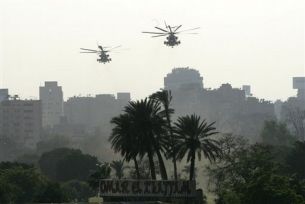Why Cairo?

There's been a fair amount of debate and discussion over the anticipated intent and effect of President Obama's address to the Muslim world, scheduled for Cairo, Egypt this Thursday. But while I've noticed some disagreement over the substance and purpose, I've heard very little about the choice of location.
If the president really wants to address the so-called Muslim World (a questionable label, at best), wouldn't it make sense to do so from the most populous Muslim country, one of the most prosperous, and arguably the most democratic?
The country I'm alluding to? Indonesia. I asked Dr. Marcus Mietzner of Australian National University - an expert in Indonesian elections and military affairs - for his thoughts on the choice of Cairo over Jakarta, and he offered the following insights:
Obama's decision [is] understandable and politically rational. While Indonesia is the world's largest Muslim nation, the political center of Islam is still the Middle East. This is where political problems are most protracted, and this is where Obama wants to find an audience. Indonesia is not a player in these conflicts, despite its ambitions to act as a mediator. Had Obama given the speech in Jakarta, no doubt he would have been accused of choosing an easy path - speaking in front of mostly moderate Muslims and even former class mates from Menteng.
A fair point, but while the Cairo selection certainly makes political sense, I fail to see what makes it the easier one. As Michael Crowley points out, it would seem as though Obama is already inoculating himself against charges of hypocrisy vis-a-vis the U.S. relationship with Hosni Mubarak's Egyptian police state. If Obama really wanted to make a statement to the so-called Muslim World, he could have chosen a place like Jakarta - a democratic and politically pluralistic country struggling with the difficult balancing act of religion and governance.
The fact that "political Islam" is mostly confined to the Middle East could be, one might argue, part of the problem. The United States has for decades made the false choice in the region between Islamic theocrats and quasi-secular autocrats. The assumption has been that the two are mostly irreconcilable, with the historical preference often going toward the malleable and corruptible autocrat.
However, as my co-blogger Greg Scoblete often points out, the need to pivot preferred powers off of less favorable powers in the region has waned with the end of the Cold War. Many have suggested that this is the moment for the U.S. to apply pressure on Jerusalem over policies that are inconsistent with American interests. So why should Cairo and Riyadh be any different?
Alliances won't break because the American president critiques an ally - see Israel. Whitewashing Mubarak's human rights record for the sake of "stability" is the same faulty logic used by several of Obama's White House predecessors. Choosing "stability" often leads to anarchic instability, as was demonstrated in 1979 Iran.
So Cairo it is. But does the United States gain anything by prolonging the same false choice in the Middle East?
UPDATE: Thanks to our friend Michael Totten for the Insta-link.
Also, check out this post by Cato's David Boaz from last month. He is equally puzzled by the Cairo selection, and reminds us that Islam and the Middle East aren't necessarily synonymous.



